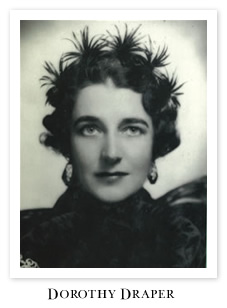| |
Ron Renner Interview

Luxuries Today Magazine Ron Renner Interview
by Michael Lindquist
 I recently had the privilege to dialogue with one of Interior design's leading
talents, Ron Renner. For the handful who may not have heard of this multi-talented
genius, I'll give you his formal bio first. I have enough hyper-links in this
post to launch the space shuttle. Click on them and check out home pages with
all their terrific info. Read and enjoy...
I recently had the privilege to dialogue with one of Interior design's leading
talents, Ron Renner. For the handful who may not have heard of this multi-talented
genius, I'll give you his formal bio first. I have enough hyper-links in this
post to launch the space shuttle. Click on them and check out home pages with
all their terrific info. Read and enjoy...
Ron Renner, President and Founder of Certified Interior Decorators
International (C.I.D.), has a long history of firsts. One of the nation's
first state licensed interior designers, worked behind the scenes as a founding
member of the American Society of Interior Designers (ASID), one of the
first NCIDQ Certified Interior Designers.
Ron is dedicated to the professional training and testing of Interior Decorators
who choose not to become Interior Designers. Thanks to Ron, Certified Interior
Decorators are now recognized by the consumer and trade resources as professionally
trained, educated and tested.
Ron serves as President and Director of Decorators Training Institute,
which is a C.I.D. accredited distance learning institution for individuals desiring
to become Certified Interior Decorators. Teachings include state regulations
of interior designers and the practice of interior design versus interior decoration.
Interior decorators are able to earn certification credentials and fellowship
with a professional organization exclusively for certified interior decorators.
Also, his artwork has been featured on the cover of Palm Beach Illustrated
and is listed in the Art in America Annual Guide. Ron studied at the
Philadelphia College of Art and also at Fleisher Art Memorial.
Now onto my interview...
| 1. |
 People
may mistakenly think hiring an Interior Decorator is only for the rich
and famous. How do you dispel that notion? People
may mistakenly think hiring an Interior Decorator is only for the rich
and famous. How do you dispel that notion?
Interior Designers and Decorators have made themselves aloof and unapproachable
over the years. Interior design professionals need to make an effort
to dispel that notion by educating potential clients that we are the
"best value for the decorating dollar spent". Professionals
are not only affordable but will save money by avoiding costly mistakes
in selection, placement and purchases of furnishings. Certified Interior
Decorators are trained to relate to the needs of the clients on
all levels. Appropriate advertising is necessary to allow the consumer
to know the many benefits of hiring a "Certified" professional.
|
| |
|
| 2. |
Beauty is in the eye of the beholder. Having said
that, with unlimited styles and individual tastes to consider, how do
you decorate with an outcome that has a timeless quality and yet represents
the client’s current preferences?
Many clients are not sure what they like or if they have a certain style,
mainly due to the fact that they have not had the time to give thought
to what they prefer. It is up to the decorator to analyze their lifestyle
and background very carefully in the initial interview. The selection
process can be an educational experience, not only for the client but
also for the decorator as they discover more about the client and their
preferences. The more the interior reflects the individual, the added
benefit is they will enjoy it for a longer time. |
| |
|
| 3. |
No Decorator wants the reputation that the room
they just finished, which was beautiful and current, had a shelf-life
which proved not very cost effective…
I believe a longer shelf life in any interior design project can be
achieved by paying close attention to the needs of the client, the architectural
elements of the project and the selection of quality furnishings. A
major benefit in dealing with a recognized professional in the interior
design industry is that the client has unlimited choices from “trade
resources” not normally available to the consumer. Also, avoiding
trends and trendy colors and color schemes is critical to the projects
“shelf-life”. As professionals, our clients can count on us
to be “trend setters” not “trend followers”.
|
| |
|
| 4. |
Every one cooks dinner, but not every one is a
chef. Many feel they can decorate their homes, pick out the right paint
combinations etc. but not all have trained eyes. What is the best way
to educate people that it’s well worth the money invested to hire
a consultant for a few hours?
Certified Interior Decorators realize that, although some potential
clients may have “talent”, they may not possess the necessary
training or resources to do work for others. Decorating clients are
made up of people in all walks of life including many professionals
such as engineers, doctors, lawyers and self-employed business owners,
many of whom have very little knowledge about interior decorating or
selecting proper colors and furnishings. Money spent on a consultation
by the hour with a trained professional will definitely prove to be
a very good investment.
|
| |
|
| 5. |
Some may not know that you were an accomplished
and successful artist first and a designer second. Is that right?
I started painting at 16 years old and was “accomplished”
in the fact that I established my style as an original “American
Action Painter and Abstract Expressionist”. Later, I attended the
Philadelphia College of Art majoring in Interior Design with a minor
in Art and Art History. My success came first as a designer after participation
in several designer show house projects, most notably, the world famous
“Vassar Designer Showhouse” in Pennsylvania. My success as
an artist came with fame gained by being an internationally known interior
designer.
|
| |
|
| 6. |
Your training and accomplishments in the Art world
had to influence your design and decorating skills…
It was really the other way around. I actually received the God-given
gift and talent to do both. I enrolled in a home study program in Interior
Decorating; upon completion I realized that this is the profession I
wanted to be in and decided to seek a formal college education in Interior
Design. Fortunately, with today’s “information technology”
advancements and the Internet, “distance learning online”
programs can now achieve formal education.
|
| |
 
|
| 7. |
While so many retailers are struggling in this
current economy - luxury brands are holding their own. What's your theory
as to why this is?
Some folks will always have money. At the turn of the twentieth century,
only wealthy people were hiring interior decorators such as Elsie
De Wolfe and Dorothy Draper. At this time, when retailers
are certainly struggling, many people are not affected by the economic
downturns and are accustomed to fine art and furnishings. Luxury brands
or “higher end” furniture will continue to be sold. Buyers
in this category are still interested in good values if and when presented.
Fine art buyers will continue to take advantage of this kind of economic
period to make good investments.
|
Copyright © 2010 Luxuries Today - All Rights Reserved
|
|
|


 I recently had the privilege to dialogue with one of Interior design's leading
talents, Ron Renner. For the handful who may not have heard of this multi-talented
genius, I'll give you his formal bio first. I have enough hyper-links in this
post to launch the space shuttle. Click on them and check out home pages with
all their terrific info. Read and enjoy...
I recently had the privilege to dialogue with one of Interior design's leading
talents, Ron Renner. For the handful who may not have heard of this multi-talented
genius, I'll give you his formal bio first. I have enough hyper-links in this
post to launch the space shuttle. Click on them and check out home pages with
all their terrific info. Read and enjoy...  People
may mistakenly think hiring an Interior Decorator is only for the rich
and famous. How do you dispel that notion?
People
may mistakenly think hiring an Interior Decorator is only for the rich
and famous. How do you dispel that notion?
